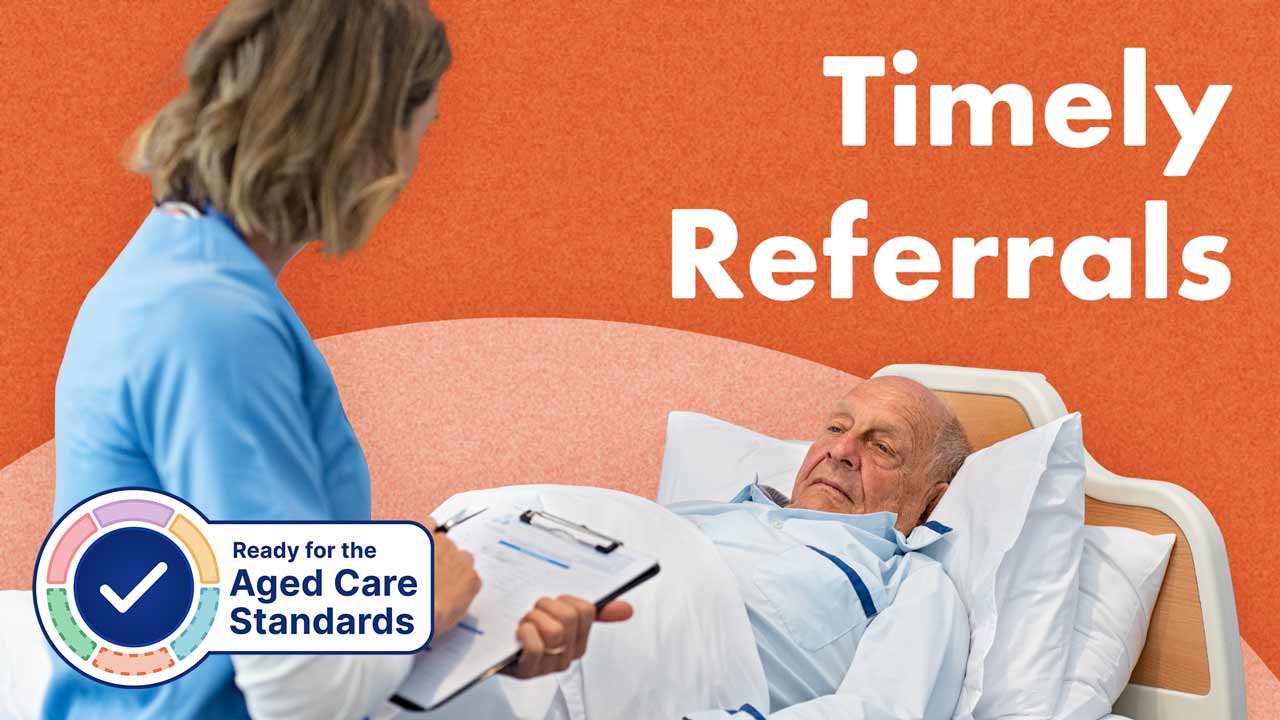Aged care clients have the right to receive the right care, in the right place, at the right time.
All care recipients are subject to changes in their condition, whether they be physical, emotional, cognitive or functional. Part of adequate care provision is being able to promptly detect these changes quickly, intervene appropriately and refer the client to a specialist service if deemed necessary (ACQSC 2022).
Timely Referrals
If a provider finds that they are unable to meet a client’s needs, goals and preferences appropriately, they are expected to consult with the client and promptly refer them to another provider, organisation or individual who is able to fulfil these needs (ACQSC 2022).
Providers should deliver care that is timely, culturally safe and in an appropriate setting. Furthermore, if the client is experiencing physical, psychological or spiritual distress, prompt interventions should be made to reduce their suffering and ensure their dignity at the end of their life (ACQSC 2022).
Under the Quality of Care Principles 2014, providers should be able to meet the needs of a diverse range of consumers. Establishing a collaborative network of providers can assist with this by making it easier to refer clients to the appropriate party (ACQSC 2022).
Timely Referrals Under the Strengthened Aged Care Quality Standards
Timely referrals are a crucial component of aged care, as outlined in the strengthened Aged Care Quality Standards.
Under Standard 3: Care and Services - Outcome 3.2: Delivery of care and services (Action 3.2.4), aged care providers are required to ensure older people receive prompt and suitable referrals for early identification and intervention, reablement, maintenance of function and quality of life, which includes referrals to relevant healthcare professionals and My Aged Care for reassessment (ACQSC 2024a).
Under Standard 5: Clinical Care - Outcome 5.4: Comprehensive care (Action 5.4.3), aged care providers are expected to refer older people to specific services and healthcare professionals when required in order to address their clinical needs. These services include:
- Medical services
- Rehabilitation services
- Allied health services
- Oral health services
- Specialist nursing services
- Behavioural advisory services.
(ACQSC 2024b)
Under Standard 7: The Residential Community - Outcome 7.2: Transitions, residential aged care providers should:
- Have processes in place for transitioning older people to and from other care environments, including hospitals, care services and the community
- Provide access to other services if they cannot appropriately meet an older person’s needs
- Maintain connections with specialist dementia care services so that older people can be referred to these services if needed.
(ACQSC 2024c)
Specialist Services
Clients may need to be referred to specialist services throughout the course of their care. These can include, but are not limited to:
- Allied health services
- Dental services
- Hearing services
- Medical services
- Psychiatric services
- Specialised therapy services.
(ACQSC 2022)
If a client requires one of these specialist services, the provider is expected to refer them in a timely manner (ACQSC 2022).

Avoidable Hospital Referrals
Knowing when to refer is just as important as knowing when not to refer.
Clients receiving care services, particularly those in residential aged care, often require acute medical services, largely due to a high prevalence of chronic disease and multiple comorbidities (VIC DoH 2016).
In fact, the Royal Commission into Aged Care Quality and Safety (2021) found that in 2018-2019, 37% of people receiving residential aged care were admitted to hospital at least once.
Unfortunately, hospital admission can place older adults at significant risk of complications such as hospital-acquired infections, falls, reduced mobility and disorientation (VIC DoH 2016; RACGP 2019).
Despite this, it’s estimated that between 13 and 67% of aged care resident hospital admissions are avoidable. Some are not necessary at all (VIC DoH 2016; RACGP 2019).
A 2019 joint report from the NSW Aged Care Roundtable found that aged care staff had witnessed avoidable emergency admissions for a range of reasons, including:
- Falls
- Palliative care
- Behaviour management
- Catheterisation or re-catheterisation
- Simple wound care
- Pain relief
- Urinary tract infections
- Dehydration or poor nutrition
- Upper respiratory tract infections
- Depression
- Lack of medication at the facility
- Elder abuse (including attacks from other residents).
Moreover, the report revealed exceptionally high rates (in some cases over 90%) of delayed patient discharge due to factors such as transport logistics, insufficient staff and lack of staff knowledge (NSW Aged Care Roundtable 2019).

Why is this occurring despite the risks that hospitalisation poses to these clients?
According to the report, residential aged care facilities are suffering from an inability to provide the level and quality of care required by their clients (NSW Aged Care Roundtable 2019).
Furthermore, residents themselves are requesting unnecessary hospital admission because they do not have confidence in their provider’s ability to appropriately respond to deterioration (NSW Aged Care Roundtable 2019).
In order to reduce the number of avoidable hospitalisations, the report made the following recommendations to providers:
- Improve staffing levels, skills mix and training
- Improve access to specialist services
- Improve medication management.
(NSW Aged Care Roundtable 2019)
While avoidable hospitalisations do occur, there are times when referrals to hospital will be necessary. Always consider what is best for your client above all else, and follow your organisation’s relevant policies.
Responding to Deterioration
Appropriately recognising and responding to deterioration is essential to ensure the client receives the care they require, in the right setting.
It is important to note that deterioration can occur rapidly or over a prolonged period. While it may indicate a medical emergency that requires immediate intervention, some deterioration is caused by untreatable factors such as disease progression. Distinguishing between the two is crucial in ensuring the client receives the correct care and is referred to the right place, if necessary (ELDAC 2022).
As care staff often spend a significant amount of time with clients (sometimes interacting with them daily), they may notice signs of deterioration. Providers should encourage care staff to report deterioration if:
- The client’s typical level of activity or engagement changes or they are reluctant to get out of bed
- The client requires extra help due to physical or mental health concerns
- The client loses weight or stays underweight
- The client has poor general health that is worsening or not improving
- The client’s symptoms are persisting even after appropriate management.
(palliAGED 2022a)

Responding to Deterioration Under the Strengthened Aged Care Quality Standards
Responding to deterioration is another important concept outlined in the strengthened Aged Care Quality Standards.
Under Standard 3: Care and Services:
- Outcome 3.1: Assessment and Planning (Action 3.1.5) requires older people’s care and services plans to be reviewed if their condition deteriorates
- Outcome 3.2: Delivery of care and services (Action 3.2.5) requires aged care workers to be supported to recognise deterioration in an older person
- Outcome 3.3: Communicating for safety and quality (Action 3.3.2) expects aged care providers to have a communication system in place to promptly communicate deterioration to all parties involved in an older person’s care.
(ACQSC 2024a)
Under Standard 5: Clinical Care:
- Outcome 5.4: Comprehensive care (Action 5.4.5) requires aged care providers to have processes for monitoring older people’s clinical conditions and reassessing when there are any changes
- Outcome 5.5: Clinical Safety requires providers to have processes for responding to signs of deterioration in an older person’s:
- Mental health
- Oral health
- Outcome 5.6: Cognitive Impairment (Action 5.6.1) expects providers to be alert to any deterioration in older people with delirium, dementia or other cognitive impairment.
(ACQSC 2024b)
How to Respond to Deterioration
Depending on the cause and type of deterioration, staff may need to:
- Seek immediate medical intervention and follow the appropriate assessment required for the specific situation
- Review the client’s care goals together with the client, their family and he/althcare team
- Commence a palliative care plan or pathway in consultation with the person, family and healthcare team
- Ensure care is being given in accordance with the client’s wishes
- Manage symptoms
- Withdraw treatments, activities or medications that are no longer appropriate or beneficial
- Provide counselling to the client, their loved ones and staff.
(palliAGED 2022b)
Responding to Specific Situations
The following is a list of Ausmed resources that may apply to specific deterioration scenarios:
- Critically ill patient assessment (ABCDE assessment)
- Chest pain assessment
- Lung, chest and bowel sound assessment
- Mental state assessment
- Nausea and vomiting assessment
- Neurological assessment
- Respiratory assessment (older adults)
- Respiratory assessment (paediatric)
- Pain assessment
- Pain assessment (critically ill patients)
- Skin, mouth and eye assessment
- Skin tear assessment
- Wound assessment
Conclusion
Clients expect to receive the right care, in the right place, at the right time. This means providers are responsible for identifying deterioration or a change of needs and promptly referring the client to the appropriate party.
Providers must also ensure they understand when hospital admission is and is not appropriate in order to minimise unnecessary distress and harm to the client. This may require additional staff training and education.
Test Your Knowledge
Question 1 of 3
Which one of the following is a cause of delayed patient discharge?
Topics
References
- Aged Care Quality and Safety Commission 2024a, Standard 3: Care and Services, Australian Government, viewed 10 May 2024, https://www.health.gov.au/resources/publications/strengthened-aged-care-quality-standards-august-2025?language=en
- Aged Care Quality and Safety Commission 2024b, Standard 5: Clinical Care, Australian Government, viewed 10 May 2024, https://www.health.gov.au/resources/publications/strengthened-aged-care-quality-standards-august-2025?language=en
- Aged Care Quality and Safety Commission 2024c, Standard 7: The Residential Community, Australian Government, viewed 10 May 2024, https://www.health.gov.au/resources/publications/strengthened-aged-care-quality-standards-august-2025?language=en/residential-community
- Aged Care Quality and Safety Commission 2022, Guidance and Resources for Providers to Support the Aged Care Quality Standards, Australian Government, viewed 28 June 2023, https://www.agedcarequality.gov.au/resources/guidance-and-resources-providers-support-aged-care-quality-standards
- End of Life Directions for Aged Care 2022, Respond to Deterioration, ELDAC, viewed 29 June 2023, https://www.eldac.com.au/tabid/5025/Default.aspx
- NSW Aged Care Roundtable 2019, Joint Report on Avoidable Hospitalisations From Residential Aged Care Facilities in NSW and Delayed Discharge, NSW Aged Care Roundtable, viewed 28 June 2023, https://www.nswnma.asn.au/wp-content/uploads/2023/10/NSW-Aged-Care-Roundtable-2019-LR-.pdf
- PalliAGED 2022a, Tips for Careworkers: Recognising Deterioration, PalliAGED, viewed 29 June 2023, https://www.palliaged.com.au/Portals/5/Documents/Practice-Tip_Sheets/Recognising-Deterioration-Careworkers.pdf
- PalliAGED 2020b, Tips for Nurses: Recognising Deterioration, PalliAGED, viewed 29 June 2023, https://www.palliaged.com.au/Portals/5/Documents/Practice-Tip_Sheets/Recognising-Deterioration-Nurses.pdf
- Royal Australian College of General Practitioners 2019, RACGP Aged Care Clinical Guide (Silver Book): Part B. Provision of After-hours Aged Care Services, 5th edn, RACGP, viewed 28 June 2023, https://www.racgp.org.au/clinical-resources/clinical-guidelines/key-racgp-guidelines/view-all-racgp-guidelines/silver-book/silver-book-part-b/provision-of-after-hours-aged-care-services
- Royal Commission into Aged Care Quality and Safety 2021, Hospitalisations in Australian Aged Care: 2014/15–2018/19, Australian Government, viewed 28 June 2023, https://agedcare.royalcommission.gov.au/sites/default/files/2021-02/research-paper-18-hospitalisations-australian-aged-care.pdf
- Victorian Department of Health 2016, Supporting the Delivery of Quality Healthcare for Aged Care Residents, State Government, viewed 28 June 2023, https://www2.health.vic.gov.au/-/media/health/files/collections/policies-and-guidelines/s/supporting-the-delivery-of-quality-healthcare-for-aged-care-residents---june-2016.pdf
Additional Resources
- Standard 3: Care and Services
- Standard 5: Clinical Care
- Standard 7: The Residential Community
- Stronger Standards, Better Aged Care Program | ACQSC
- Joint Report on Avoidable Hospitalisations From Residential Aged Care Facilities in NSW and Delayed Discharge | NSW Aged Care Roundtable
- Tips for Careworkers: Recognising Deterioration | PalliAGED
- Tips for Nurses: Recognising Deterioration | PalliAGED
- RACGP Aged Care Clinical Guide (Silver Book): Part B. Provision of After-hours Aged Care Services

